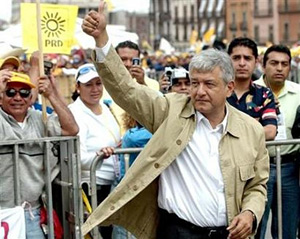 |
 |
 |
 Editorials | May 2006 Editorials | May 2006  
Meddling in Mexican Elections Could Cause Chaos
 Kenneth Emmond - MexData.info Kenneth Emmond - MexData.info


| | The last time Mexican leftist Andres Manuel Lopez Obrador lost an election, there was street fighting, political gridlock and a presidential crisis. |
What’s this about Mexican President Vicente Fox interfering in the elections?

Would anyone expect U.S. President George W. Bush to stand down from promoting the Republican presidential candidate in 2008? Did anything, other than the ill-considered wishes of Al Gore, prevent Bill Clinton from campaigning for his would-be successor in 2000?

Of course not!

Well, what’s the problem here?

Unlike the U.S., Mexico has a rule that sitting presidents cannot campaign. Like many apparently absurd rules, this one has its roots in history.

From 1929 to 2000 the Institutional Revolutionary Party (PRI) was all-powerful. Its candidate was always elected president. It controlled the judiciary and held a majority in Congress, along with most states and municipalities. Plus a sympathetic and not-so-free press buttressed its power.

This made elections a fairly simple exercise. Non-PRI candidates ran for office and occasionally even won, but elections were hardly free or fair.

As party hubris set in, the question of what constituted the PRI and what was the State became blurred in the minds of members of the political class, and even in the minds of many other citizens.

So, it was a short step for the party to start using state resources at election time.

Government buildings became PRI meeting halls, government vehicles ferried PRI candidates and their workers around, civil servants took time out from their regular duties to campaign for the PRI, and no one was sure who paid for the PRI’s media campaigns.

In the 1990s, when the nonpartisan Federal Electoral Institute (IFE) took over management of elections and real multiparty elections took place in growing numbers of jurisdictions, steps were taken to discourage questionable practices.

One of the steps was to bar the president from campaigning.

It’s good to have rules to guide a campaign, but with rules come interpretations – in this case those of the president and his party, those of the opposition parties, those of the IFE, and frequently those of the courts, whose opinions are often solicited by the losers following IFE rulings.

That brings us back to the question of whether President Fox has been campaigning for his party’s candidate, Felipe Calderon of the National Action Party (PAN)?

Is the president campaigning when he appears in a government-sponsored public announcement extolling the virtues of a government program, even though neither his party nor the election is mentioned?

Is he campaigning when a barrage of these announcements appear at election time?

The Federal Institute for Access to Public Information (IFAI) says the president’s office spent 80 million pesos [US$7.2 million] on these announcements between January and April of this year. If you’re a casual television viewer, you’ll know without counting that the number has risen by an order of magnitude.

You can pretty well guess what the partisan opinions on this issue are.

The PRI and the Party of the Democratic Revolution (PRD) are so incensed that they complained loudly, in public and before the IFE, that the campaign is, in the words of PRI candidate Roberto Madrazo, “a state-run election.”

Not so said the IFE, so both parties went to the courts in an effort to reverse this decision.

That’s where the issue stood as this column was being written, but there’s a precedent: it’s the same ploy the PRI used during the 2000 elections, with the same complaints from opposition parties.

Still, these developments are worrisome. If the PRI and the PRD win in court, it could give them the ammunition they need to have the election annulled in event of a PAN victory. This in turn could threaten political stability.

The PAN was sufficiently concerned that last week it convened a meeting of 300 lawyers to plan a defense in case they win at the polls and lose in court.

Since the formation of the IFE and similar nonpartisan state electoral bodies, state elections in Tabasco and Colima have been annulled due to voting irregularities, but never has there been a serious court challenge following a national election.

Under a “neutrality agreement” signed by the president and subsequently confirmed by him, no more public announcements were to be aired after May 23.

The question is whether the courts conclude that electoral damage has been done by the spots, and whether that decision could lead to post-electoral chaos.

Whether it makes sense or not, President Fox’s interference, or not, in the election could have repercussions that echo long after July 2.

Kenneth Emmond, an economist, market consultant and journalist who has lived in Mexico since 1995, is also | 
 | |
 |



